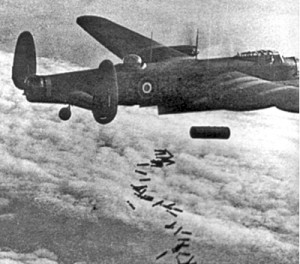Guernica in the clouds
 A large envelope in the post. Unexpected. Like the start of a story. I open it, a letter from my aunt. She’s just finished reading the enclosed manuscript. Found in a box maybe, that’s what happens. An attic, dust through beams of skylight. Did I put the box here and forget or did I never know? My aunt wouldn’t have read it there and then. Too cold in the January Borders to sit in an attic as you would in a film. So back down to the kitchen and a coffee, snow outside and the manuscript in her hand. Her father’s, my papa’s.
A large envelope in the post. Unexpected. Like the start of a story. I open it, a letter from my aunt. She’s just finished reading the enclosed manuscript. Found in a box maybe, that’s what happens. An attic, dust through beams of skylight. Did I put the box here and forget or did I never know? My aunt wouldn’t have read it there and then. Too cold in the January Borders to sit in an attic as you would in a film. So back down to the kitchen and a coffee, snow outside and the manuscript in her hand. Her father’s, my papa’s.
He died in 1985 and I was sick along Arcan Road. Twilight of a blue Highland day and puking in a ditch, my aunt’s hand on my back. I insisted on seeing his body. There’s a Buddhist practice to meditate on corpses to emphasise the reality of impermanence. Bit too weird for a 10 year-old, though, that first awareness of death. Scottish gothic. Not quite ‘you’ll have had your tea?’ than ‘you’ll have done your contemplation of the deid?’
I knew he wrote. We published his poems some years back. Short stories too. I didn’t know he’d written a book. ‘Chaos is Dark’, a fiction derived from his own life. Neatly typed back in the 50s. Hand-written annotations and corrections. Synchronicity demanded that my aunt find the manuscript on the 70th anniversary of the firebombing of Dresden. Like Kurt Vonnegut he too saw the ‘carnage unfathomable’ of this war crime, taken there in the aftermath from his POW camp by furious Germans to be shown- a witness to immorality- what our government had done in his name. He thought he was going to be shot. Chaos is most definitely dark.
Glimpses of war horror. That’s what papa gave, by all accounts. In the eighties I wasn’t interested in all that. I just wanted to do the Morecambe and Wise leg-crossing sketch with him. But I began to wonder what everyone else wondered. The poems gave more detail. Contemplation of a shattered faith from the bomb hatch of a Wellington. Sadness in the bones and a deep perplexity. He flew above it all, a bird’s eye view of inhumanity, a distance that might have made it slightly easier to bear or might have made it worse. A bigger canvas. Guernica in the clouds.
And now a manuscript. An opener in his POW camp and a numbing description of utter boredom.
No dramatic Great Escape jollity and ‘keep up the spirits lads’. Just lost time, the epic waste of working class men, stuck behind a wire fence. The dislocation is striking. The return home to people no longer recognised, mutual non-understanding in a place now skewed and wouldn’t anywhere be the same? How do you cross it, the chasm ripped open between your memories of human warmth and your experience of its utter degradation? Hunger in your stomach. Sullen indifference to the guards and a sad-eyed Hausfrau watching you walk out of the camp on the day of liberation.
It’s unfinished, the manuscript. That seems right. There was perhaps no end to what he was telling. I wonder if he simply became tired with trawling the memories, closure as distant as ever. It’s not often you get a gift from the past; the gift of a man known and unknown. Thoughts boxed inside that he had to unpack. Then 60 years in another box before a young man again steps off a troop train with a Thomas Carlyle book in his hand and what stick he must have got for that! I see a man I might have bumped into in the NAAFI or the mess hall. I reckon we would have got on well, me and him.
